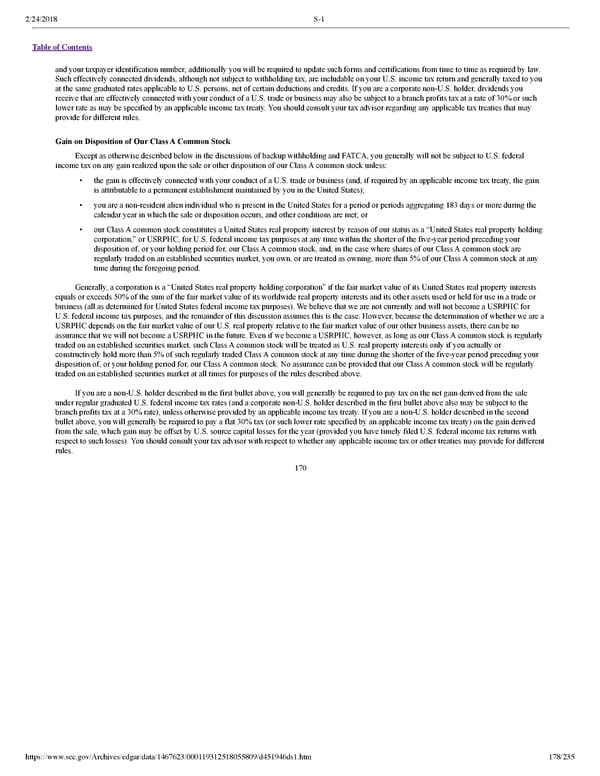2/24/2018 S-1 Table of Contents and your taxpayer identification number; additionally you will be required to update such forms and certifications from time to time as required by law. Such effectively connected dividends, although not subject to withholding tax, are includable on your U.S. income tax return and generally taxed to you at the same graduated rates applicable to U.S. persons, net of certain deductions and credits. If you are a corporate nonU.S. holder, dividends you receive that are effectively connected with your conduct of a U.S. trade or business may also be subject to a branch profits tax at a rate of 30% or such lower rate as may be specified by an applicable income tax treaty. You should consult your tax advisor regarding any applicable tax treaties that may provide for different rules. Gain on Disposition of Our Class A Common Stock Except as otherwise described below in the discussions of backup withholding and FATCA, you generally will not be subject to U.S. federal income tax on any gain realized upon the sale or other disposition of our Class A common stock unless: • the gain is effectively connected with your conduct of a U.S. trade or business (and, if required by an applicable income tax treaty, the gain is attributable to a permanent establishment maintained by you in the United States); • you are a nonresident alien individual who is present in the United States for a period or periods aggregating 183 days or more during the calendar year in which the sale or disposition occurs, and other conditions are met; or • our Class A common stock constitutes a United States real property interest by reason of our status as a “United States real property holding corporation,” or USRPHC, for U.S. federal income tax purposes at any time within the shorter of the fiveyear period preceding your disposition of, or your holding period for, our Class A common stock, and, in the case where shares of our Class A common stock are regularly traded on an established securities market, you own, or are treated as owning, more than 5% of our Class A common stock at any time during the foregoing period. Generally, a corporation is a “United States real property holding corporation” if the fair market value of its United States real property interests equals or exceeds 50% of the sum of the fair market value of its worldwide real property interests and its other assets used or held for use in a trade or business (all as determined for United States federal income tax purposes). We believe that we are not currently and will not become a USRPHC for U.S. federal income tax purposes, and the remainder of this discussion assumes this is the case. However, because the determination of whether we are a USRPHC depends on the fair market value of our U.S. real property relative to the fair market value of our other business assets, there can be no assurance that we will not become a USRPHC in the future. Even if we become a USRPHC, however, as long as our Class A common stock is regularly traded on an established securities market, such Class A common stock will be treated as U.S. real property interests only if you actually or constructively hold more than 5% of such regularly traded Class A common stock at any time during the shorter of the fiveyear period preceding your disposition of, or your holding period for, our Class A common stock. No assurance can be provided that our Class A common stock will be regularly traded on an established securities market at all times for purposes of the rules described above. If you are a nonU.S. holder described in the first bullet above, you will generally be required to pay tax on the net gain derived from the sale under regular graduated U.S. federal income tax rates (and a corporate nonU.S. holder described in the first bullet above also may be subject to the branch profits tax at a 30% rate), unless otherwise provided by an applicable income tax treaty. If you are a nonU.S. holder described in the second bullet above, you will generally be required to pay a flat 30% tax (or such lower rate specified by an applicable income tax treaty) on the gain derived from the sale, which gain may be offset by U.S. source capital losses for the year (provided you have timely filed U.S. federal income tax returns with respect to such losses). You should consult your tax advisor with respect to whether any applicable income tax or other treaties may provide for different rules. 170 https://www.sec.gov/Archives/edgar/data/1467623/000119312518055809/d451946ds1.htm 178/235
 Dropbox S-1 | Interactive Prospectus Page 177 Page 179
Dropbox S-1 | Interactive Prospectus Page 177 Page 179